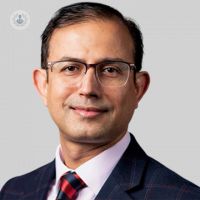Your all-you-need-to-know guide on hip replacement surgery
Written in association with:In this article below, Mr Muhammad Adeel Akhtar, a highly experienced consultant trauma and orthopaedic surgeon, tells us how hip replacement surgery is typically performed, and how long hip replacements generally tend to last for.

What does hip replacement surgery involve?
Hip replacement surgery involves replacing the ball and socket part of the hip joint. A metal implant (stem) is inserted in the thigh bone and another metal and plastic implant (cup) is inserted in the pelvic bone after preparation. A metal head moves in the plastic cup, relieving pain and improving function.
How long does a hip replacement last?
It depends on how patients use it. On average, it can last around 15 years. However, the main purpose of total hip replacement surgery is for patients to be pain-free and to be active and enjoy their life. Very few patients need revision surgery if the artificial hip joint also wears out. This can be replaced again if necessary.
What are the risks and complications associated with hip replacement surgery?
Every operation has certain risks associated with it. Common risks associated with hip replacement surgery are infection, nerve and vessel injury, fracture, dislocation, as well as limp and leg length discrepancy. However, with careful planning and execution, these risks can be minimised.
What is the recovery time for hip replacement surgery?
Hip replacement surgery is one of the most successful operations. Most patients are able to walk on the same day after their surgery and able to go home within the first few days. Patients are generally able to walk independently within the first four to six weeks.
How does hip replacement surgery affect activity and mobility?
Hip replacement surgery improves activity and mobility. Patients are able to walk independently and return to their hobbies and activities of daily living as their pain from hip arthritis disappears.
To schedule in an appointment with Mr Muhammad Adeel Akhtar, visit his Top Doctors profile today.


